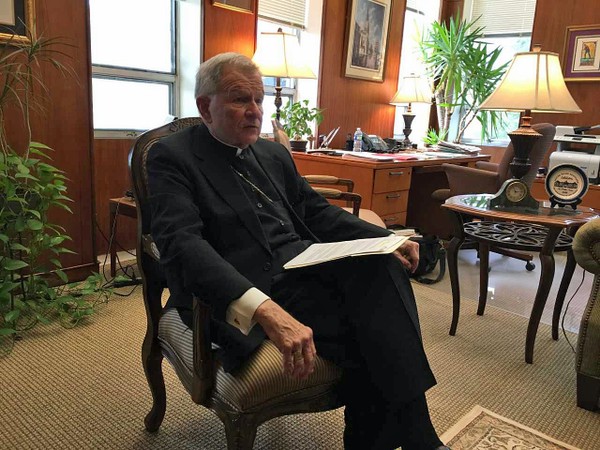No More Delays, Louisiana Bishops Must Release Names of Pedophile Priests
The Times-Picayune
After decades of secrecy, Louisiana's Catholic bishops are considering releasing the names of priests with credible accusations of abuse against them. New Orleans Archbishop Gregory Aymond, in an interview with NOLA.com | The Times-Picayune Thursday (Sept. 20), said a decision should come soon. The right decision should be obvious: The priests ought to be identified. There should be no exceptions for priests who are deceased or who have left the church. And the disclosure should include the names of any lay abusers who preyed on victims under the cover of the church. Devout Catholics regard the sacrament of reconciliation as a pillar of their faith. They are taught from early childhood that fully confessing one's misdeeds is the first step toward forgiveness and spiritual healing. The bishops should now practice what they preach. For the good of the community, the church, and most importantly the victims, they must release the names of the accused and cooperate fully in the civil and criminal proceedings that are sure to follow. These priests harmed children and inflicted unimaginable pain on them and their families, pain that continues decades later. The Catholic Church for years has shielded most of these priests and other abusers who worked in and for the church. The secrecy allowed some of them to move on to other ministries, where they could abuse more children. Archbishop Aymond said in the interview that he believes transparency is essential. But he also said the possibility of releasing the names is "riddled with problems," particularly in cases where the abusive priest has died. Those problems are of the church's making. If the church's hierarchy had decided sooner to be transparent and to confront abuse, the scandal might not have festered. Whether a priest is living or dead should make no difference now, if there are credible accusations against him. What is important is publicly recognizing the harm done to victims by these predators. There can be no healing without openness by the church. An August grand jury report in Pennsylvania shows the depth of the scandal. The grand jury, using internal documents from six Catholic dioceses, identified more than 300 priests believed to have sexually abused more than 1,000 children. Since the grand jury report, about 40 of almost 200 dioceses across the United States have released the names of priests accused of abusing children in the past. In Louisiana, the church hierarchy has been silent up to now. In 2014, the Diocese of Lafayette acknowledged $26 million in payments to 123 victims of priest sex abuse between 1950 and 2002 but refused to release the names of the priests. Daily Advertiser reporters asked again earlier this summer for the names, but Bishop Douglas Deshotel would not commit to releasing them. He now says he is considering it. Archbishop Aymond emphasized that only two of the cases announced in Pennsylvania occurred after 2002, when the Conference of Bishops created procedures to make the church more accountable and prevent further abuse. Clergy and laypeople who serve in churches are now subject to screening and Catholic school students and others involved in archdiocese programs are being taught how recognize when predators are grooming them and how to report their concerns. When abuse is discovered, a priest is immediately defrocked and the parishes in which he worked are notified. "There is no secret list," Archbishop Aymond said Thursday. "When an accusation is found to be credible, it is made public." Those are positive developments, but they don't negate the horrific behavior by priests in the past or the church's role in covering that up. The archbishop acknowledged that the history of shielding pedophile priests was a "terrible, terrible, terrible" sin. That is why it is important now to acknowledge the harm that was done and by whom. Some of those old cases have come to the surface since the Pennsylvania grand jury report. The New Orleans Advocate reported this month that at least 10 men have claimed they were sexually abused as children by George Brignac, a defrocked Roman Catholic deacon. He worked as a teacher at St. Matthew the Apostle School in River Ridge in the mid-1970s. The newspaper reported that Mr. Brignac continued to be a lay minister at St. Mary Magdalen Catholic Church in Metairie, even though the archdiocese had settled a claim that he repeatedly raped an 8-year-old altar boy at Holy Rosary School in New Orleans. The New Orleans Police Department is investigating those allegations, according to news reports. The archdiocese said it was unaware that Mr. Brignac, 83, was involved in ministry. That is another argument for releasing the names of pedophile priests. They may be working with children somewhere without anyone knowing their past crimes. That puts more children at risk. The priest abuse scandal is worldwide, but it began in Louisiana -- in the Diocese of Lafayette. The Rev. Gilbert Gauthe was convicted in 1985 of sexually abusing as many as 39 young children between 1972 and 1983. Clearly, he has not been the only abusive priest or deacon in our state. The bishops need to do the right thing and finally release those names.
|
.
Any original material on these pages is copyright © BishopAccountability.org 2004. Reproduce freely with attribution.
